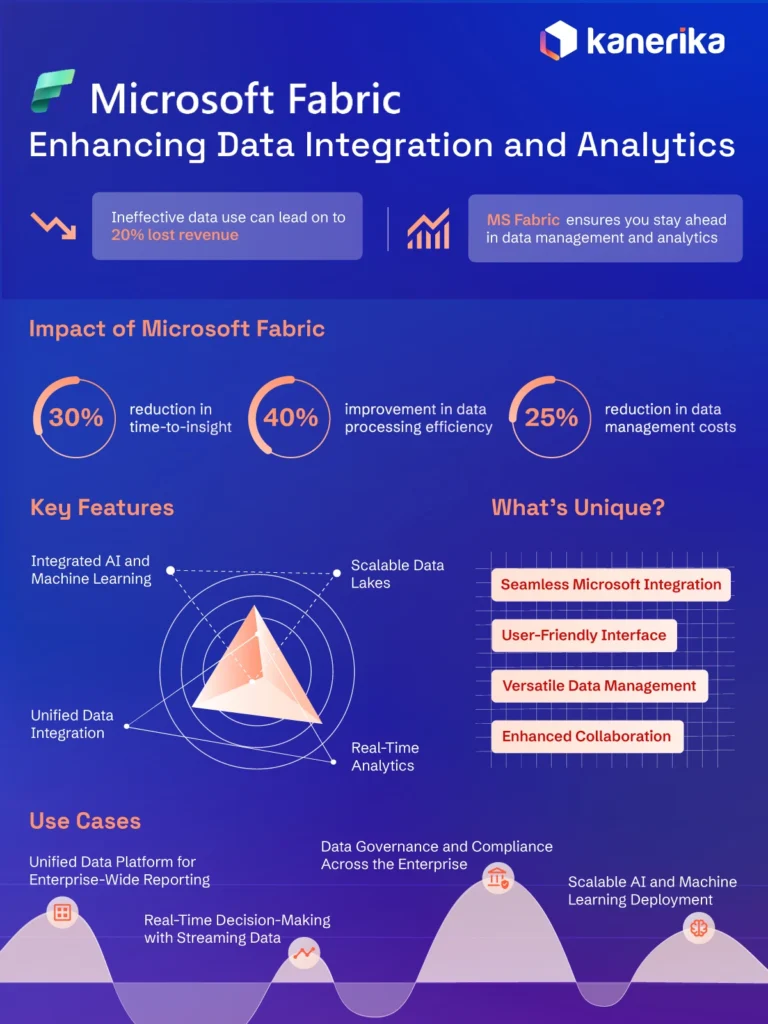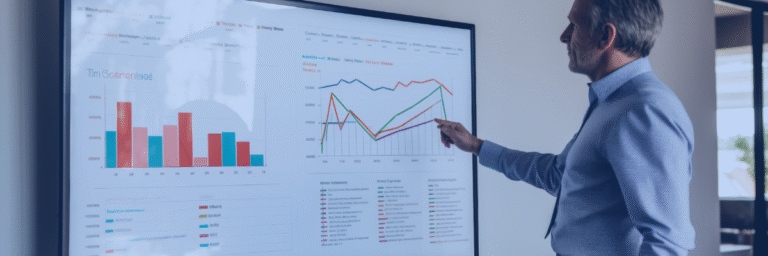Microsoft Fabric is already leading the analytics game, and with its latest enhancements in AI and security capabilities, it is poised to become the #1 AI-powered analytics platform, overtaking its counterparts by delivering unmatched scalability, unified data integration, and enterprise-grade intelligence.
The latest AI capabilities aren’t just impressive tech specs—they’re practical advancements that help companies spot opportunities their competitors miss. Meanwhile, enhanced security gives leadership the confidence to move faster without compromising protection.
Companies still patching together legacy analytics systems are finding themselves outmaneuvered by Microsoft Fabric adopters who spend less time wrestling with infrastructure and more time extracting valuable insights.
“Microsoft Fabric has set a new benchmark in analytics, bringing together data integration, governance, and AI-driven insights. As one of the early implementors, we’ve seen firsthand how Fabric delivers exceptional ROI for our clients. With these new upgrades, it’s not just improving—it’s redefining what’s possible in modern data analytics.”
– Amit Chandak, Chief Analytics Officer, Microsoft MVP at Kanerika Inc.

Microsoft Fabric’s Answer to Today’s Most Pressing Analytics Challenges
Did you know that over 80% of enterprise data is unstructured, making it difficult to analyze with traditional tools while 65% of businesses report delays in decision-making due to data silos and fragmented analytics platforms?
These challenges lead to increased costs, slower insights, and limited AI adoption. Microsoft Fabric directly addresses these pain points by:
- Unifying disparate analytics workloads on a single platform
- Eliminating data movement between services with shared storage
- Simplifying governance and security across the entire data estate
- Providing built-in AI capabilities that enhance every stage of the analytics process
- Enabling seamless collaboration between data professionals of all specialties
Microsoft Fabric Latest Enhancements for Data Teams
See the latest enhancements in Microsoft Fabric, including updated analytics, governance tools, and performance boosts for modern data workloads.
Features That Set Microsoft Fabric Apart from Other Analytics Platforms
1. Unified Analytics Platform
Microsoft Fabric unifies various analytics services into a single SaaS platform, eliminating the need to stitch together disparate tools. It provides a seamless experience from data ingestion to visualization with shared services for security, governance, and administration.
- Integrated OneLake data lake that serves as a single source of truth across all workloads
- End-to-end analytics workflow from data movement to business intelligence
- Simplified licensing model with a single capacity-based approach
2. OneLake Data Storage
OneLake is Fabric’s unified storage layer that functions as an organizational-wide data lake. It enables teams to work with their preferred tools while maintaining data consistency and eliminating data silos and duplication.
- Delta Lake format compatibility enabling open-standard data processing
- Direct Query capabilities allowing analysis without data movement
- Shortcuts feature for connecting to external data sources without replication
3. Real-Time Analytics
Fabric excels at processing and analyzing streaming data in real time, enabling organizations to make immediate decisions based on current data rather than historical snapshots.
- KQL (Kusto Query Language) database for high-performance real-time analytics
- Eventstream capability for simplified data ingestion from various streaming sources
- Real-time dashboarding that updates automatically as new data arrives
4. AI Integration
Microsoft Fabric deeply integrates with AI capabilities, making it easier to build, deploy, and use AI models within the same environment as your data analytics.
- Native integration with Azure OpenAI Service and Copilot for analytics
- Built-in AI tools for text analysis, anomaly detection, and forecasting
- Simplified MLOps with integrated model training, deployment, and monitoring
5. Power BI Direct Lake Mode
Fabric introduces Direct Lake mode in Power BI, fundamentally changing how BI tools interact with underlying data for improved performance and governance.
- Query performance at data lake scale without traditional data warehousing overhead
- Semantic layer that maintains consistency across all reporting and analysis
- Real-time data refreshes without requiring manual dataset refreshes or imports
It Just Got Better: Microsoft Unveils Game-Changing New Upgrades for Fabric
Microsoft has unveiled a slew of new features at the FabCon 2025 conference and it’s a delight to review them here with you. Combined, they take your productivity to a whole new level.
1. Security Enhancements
OneLake Security
For data-driven organizations, managing granular data security across diverse applications and analytics platforms is challenging, often requiring a delicate balance between overly restrictive access controls and potential data exposure.
Microsoft Fabric’s OneLake addresses this by centralizing data from multi-cloud and on-premises environments, allowing data professionals to discover, explore, and manage data in a unified platform.
OneLake Security also enables precise access control across all analytics engines, with features like security roles, granular permissions, and row- and column-level access management.
2. Copilot for All Fabric SKUs
Realizing the immense value that copilot brings to Fabric, Microsoft has now extended its AI capabilities to all SKUs of Fabric not just the F64 SKU. Here are some of the game-changing AI enhancements that make Fabric a complete, AI-powered data platform:
3. Key Platform Upgrades
Fabric Command Line Interface (CLI)
The new CLI terminal offers a streamlined, code-first experience for Fabric. Execute commands through interactive prompts or scripts, giving both users and administrators a powerful, click-free way to explore and leverage Fabric’s capabilities through code.
CI/CD Enhancements
Microsoft now delivers comprehensive end-to-end CI/CD support across the Fabric platform with powerful new features including workspace variable libraries, GitHub service principal integration, and Phase II Fabric API deployment pipelines. These enhancements streamline configuration management within workspaces, ensuring consistent scaling across all lifecycle stages.
User Data Functions
User Data Functions allow you to implement and reuse custom business logic across ABC DS and DE workflows, enabling developers to create specialized experiences while enhancing overall efficiency.
4. Workload Improvements
Code Migration Assistant and Workload Development Kit
These tools help accelerate your modernization journey by simplifying migration from AQL Server, Synapse dedicated SQL pools, and other data warehouses to Fabric data warehouse, while enabling developers to seamlessly build and integrate applications directly within Fabric.
Logical Data Modeler
This new solution simplifies the management of industry-standard data models, optimizing Synapse DB templates to help organizations develop downstream applications with enhanced semantics.
Manufacturing Data Solutions
Manufacturing data solutions connects separate data sources from OT, IT, and ET systems, breaking down silos to help you get more value from your data and prepare for AI-powered applications.
Digital Twin Builder
Using this, organizations can model, integrate, and contextualize their environments to gain real-time insights, enabling smarter decisions and improving operational efficiency.
5. Copilot Experience in Fabric’s OneLake Catalog
Copilot in Fabric OneLake simplifies data management by providing clear descriptions and summaries of your data sources. Users can find and organize their information more quickly, with the added convenience of accessing the OneLake catalog directly from Excel.
6. Copilot Experience in Power BI
Fabric enables business users to effortlessly extract key insights from a Power BI report by simply asking Copilot. With AI-powered Q&A and intuitive visuals integrated directly into applications, users can quickly interact with their data. This conversational interface makes it easy to explore content, find answers, and conduct ad hoc analysis more effectively.
7. Microsoft Purview integration with Copilot in Fabric
Purview is now integrated with Copilot in Fabric. This helps improve security and oversight of AI use. The system can find sensitive information in conversations, suggest security improvements, and look into potentially risky AI activity through Insider Risk Management.
It also helps organizations follow Purview’s rules for record-keeping, searching information, storing data, and finding policy violations. Users can also benefit from Purview’s Data Leak Protection (DLP) feature to detect sensitive data uploads.
Kanerika – Your Trusted Fabric Implementation Partner
Now that you have seen the amazing features of Fabric, you’d be wondering how we implement this for our needs. Fear not, because when it comes to implementing Microsoft Fabric, Kanerika is the trusted partner in your journey. Our comprehensive implementation process includes:
1. Assessment and Strategy Development
We start by analyzing your organization’s data challenges and objectives, crafting a custom strategy that aligns Microsoft Fabric’s capabilities with your specific needs.
2. Architecture Design
Our team designs a robust data architecture that optimizes data flow, storage, and processing, while ensuring seamless integration with your existing systems to minimize disruption.
3. Implementation and Configuration
We manage the complete setup and deployment of Microsoft Fabric, including a secure data migration process to ensure a smooth transition.
4. Customization and Optimization
Tailored solutions like dashboards and reporting tools are developed, with ongoing performance tuning to maximize efficiency and effectiveness.
5. Training and Support
Comprehensive user training is provided to fully leverage Microsoft Fabric, with ongoing support to address issues and adapt to evolving business needs.
Our Custom Solutions for Data Platform Modernization
Kanerika understands that businesses need to move from outdated systems to modern data platforms. Upgrading legacy infrastructure makes data easier to access, improves reporting accuracy, provides real-time insights, and reduces maintenance costs. However, manual migration can be slow, complex, and error-prone, often disrupting business operations.
To solve this, Kanerika has built automation solutions that simplify migrations across multiple platforms with speed and accuracy. Our tools ensure smooth transitions from SSRS to Power BI, SSIS/SSAS to Fabric, and Tableau to Power BI. By reducing manual effort and maintaining data integrity, we help businesses upgrade seamlessly and efficiently.
Success Stories: Kanerika’s Fabric Implementation Expertise
1. Migration of Data Pipelines from SQL Server Integration Services (SSIS) to Microsoft Fabric
A large enterprise facing complex data management challenges sought to modernize its data infrastructure. The client needed to migrate SQL Server Integration Services (SSIS) data pipelines to Microsoft Fabric, aiming to reduce operational complexity, enhance scalability, and lower infrastructure costs.
Kanerika developed an automated migration framework that:
- Extracted and analyzed existing SSIS pipelines
- Utilized PySpark notebooks for advanced transformations
- Converted SSIS transformations using Power Query
- Implemented cloud-native solutions in Microsoft Fabric
- Ensured data security through role-based access and encryption
- Eliminated on-premises infrastructure costs
The solution provided a seamless, automated approach to data pipeline modernization, significantly improving the client’s data management capabilities.
Results:
- 30% Improvement in Data Processing Speed
- 40% Reduction in Operational Costs
- 25% Decrease in Manual Maintenance Efforts
2. Optimizing Logistics Reporting and Analytics Using MS Fabric
A privately owned third-party logistics (3PL) company sought to standardize its enterprise reporting and analytics capabilities. The client needed a robust solution to create interactive dashboards that could provide real-time insights, leveraging their existing SQL database infrastructure of under 1 TB.
Kanerika addressed the challenges by:
- Implementing Microsoft Fabric demonstrations for large dataset management
- Developing customized Power BI reports to enhance decision-making
- Creating tailored visualization tools for real-time data reporting
- Seamlessly integrating advanced reporting capabilities
The solution transformed the client’s data visualization approach, enabling more effective insights and operational intelligence through modern, interactive reporting tools.
Results:
- 75% Increase in Data processing speed
- 80% Reduction in report generation time
- 62% Increase in effective decisions
Why Choose Kanerika for Fabric Deployment?
1. Certified Microsoft Fabric Implementation Team
Our team comprises certified experts who have in-depth knowledge and experience in deploying Fabric solutions.
2. Microsoft MVP and Superusers Onboard
We have a Microsoft Most Valuable Professionals (MVP) and Superusers as part of our team, ensuring the highest level of expertise.
3. One of the First Fabric Implementors
We are proud to be among the very first implementors of Microsoft Fabric, giving us unparalleled experience.

4. Microsoft Data and AI Solutions Partner
As a Microsoft solutions partner, we are recognized for our proven track record in delivering successful data and AI projects.
5. Proven Expertise
Our portfolio includes numerous successful Microsoft Fabric implementations, showcasing our ability to deliver results.
6. Certified FAIAD Delivery Partner
We are a Fabric analyst in a day delivery partner for Microsoft, emphasizing our expertise in Microsoft Fabric solutions.
Final Thoughts
Microsoft Fabric’s latest enhancements transform it into a formidable AI-powered analytics platform that delivers tangible business value. By unifying disparate data processes, enabling real-time insights, and seamlessly integrating AI capabilities, Fabric empowers organizations to make faster, more informed decisions.
The platform’s intelligent automation reduces technical complexity while improving data governance, allowing teams to focus on extracting meaningful insights rather than managing infrastructure.
Frequently Asked Questions
What makes Microsoft Fabric the #1 analytics platform?
Microsoft Fabric combines seamless data integration, powerful analytics capabilities, and cutting-edge AI in a unified platform. Its end-to-end solution eliminates data silos, provides real-time insights, and offers unmatched scalability while maintaining enterprise-grade security, making it the industry’s most comprehensive analytics ecosystem.
Can Microsoft Fabric integrate with other tools in my organization's tech stack?
Yes, Microsoft Fabric provides extensive integration capabilities with both Microsoft and third-party applications. The platform features open APIs, pre-built connectors for popular services, seamless integration with Microsoft 365, and support for industry-standard protocols ensuring compatibility with existing enterprise systems.
What advantages does Microsoft Fabric offer over competing analytics platforms?
Microsoft Fabric offers unmatched integration with Microsoft’s ecosystem, superior AI capabilities, and enterprise-grade security. It eliminates the need for multiple tools by providing a unified experience for data engineering, warehousing, and visualization while offering lower total cost of ownership compared to competitors.
What is the security feature of Microsoft Fabric?
Microsoft Fabric features OneLake Security, which centralizes access control across all analytics engines. It supports granular permissions, role-based access, and row- and column-level security. This unified security model simplifies managing data protection in multi-cloud and on-premises environments while giving teams fine-tuned control over who sees what.
Is Copilot available in Microsoft Fabric?
Yes, Copilot is now available across all Fabric SKUs, not just premium ones. It brings AI-powered features to every part of the platform—from helping manage data in OneLake to answering questions in Power BI—making it easier for users to work with data using natural language and automation.
Is Fabric security strict?
Yes, Fabric’s security is robust and flexible. With OneLake Security, you can set precise controls down to the row and column level. The integration with Microsoft Purview adds extra protection by detecting sensitive data, monitoring AI usage risks, and ensuring policy compliance across your data environments and workflows.
Is Microsoft Fabric a SaaS or PaaS?
Microsoft Fabric is a Software-as-a-Service (SaaS) offering. It brings together tools like Power BI, Synapse, and Data Factory into one unified platform, hosted and managed by Microsoft. This allows users to focus on building solutions without worrying about underlying infrastructure or maintenance tasks.
What does Fabric mean in security?
In Microsoft’s context, “Fabric” refers to a unified data platform with built-in security. It uses OneLake Security and Microsoft Purview to apply consistent security policies, access rules, and data protection measures across all analytics tools. This helps protect sensitive data while still enabling collaboration and business insights.
What are the benefits of Microsoft Fabric?
Microsoft Fabric streamlines data work by combining powerful tools under one platform. Benefits include AI automation with Copilot, better security through OneLake and Purview, improved developer experience via CLI and CI/CD, and strong integration for real-time data modeling, reporting, and business logic—all in a scalable SaaS setup.










